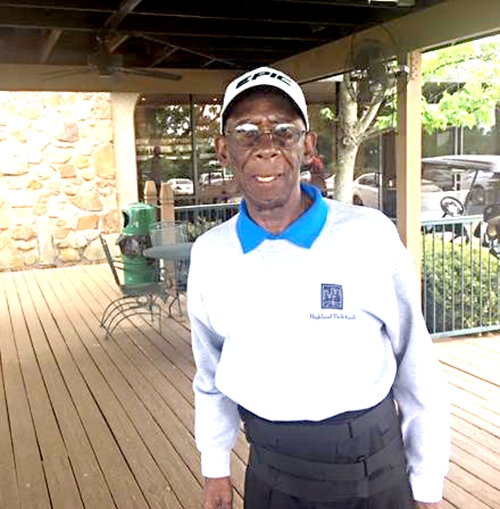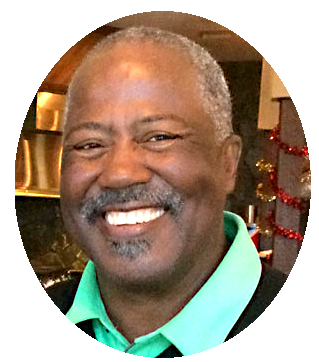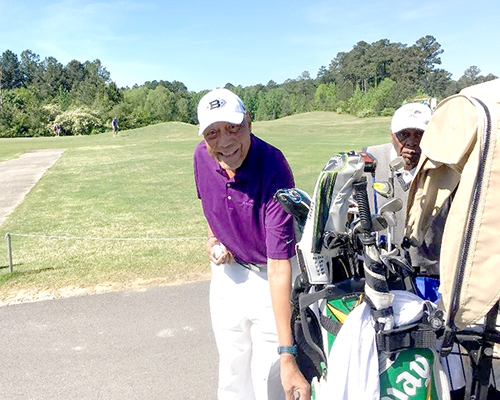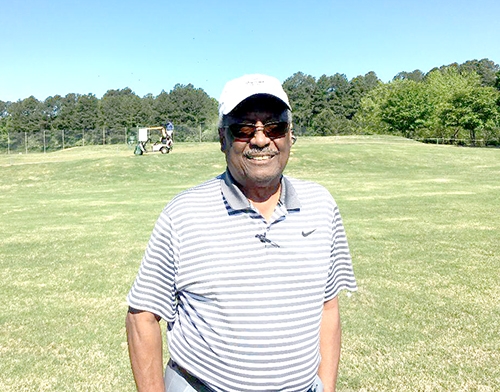By Otis Windham
(May 9, 2019)
Birmingham’s golf history has a significant milestone. Birmingham city courses were closed by the city officials for a year—rather than integrate in 1962. They reopened June 29, 1963, to everyone. National Public Radio (NPR) observed this milestone fifty years later on their daily program All Things Considered “The Desegregation Of Birmingham’s Golf Courses” by Audie Cornish (air date June 20, 2013).
Dr. Jesse Lewis was a member of that first group of African American Golfers who teed off at Highland Park Golf Course in 1963 on the day the city courses reopened. Highland Park did not allow integrated play before that day. Dr. Lewis was one of those interviewed by NPR in the observance of the fifty year anniversary of the integration of the city courses in 2013.
Dr. Lewis is a prominent Birmingham business icon, entrepreneur and an avid golfer who is also founder and owner of The Birmingham Times.
He is also one of the founding members of the African American Vulcan Golf Group in Birmingham. He is an advocate of the game and a self-taught golfer. He played during a time when golf for African Americans sometimes meant driving as far as Huntsville to play. Dr. Lewis has enjoyed the game for a long time and has played with many prominent golfers and celebrities over the years. He is a mainstay at the Region’s Tradition Pro Am of the Champions Tour professional golf tournament hosted each year in Birmingham.
“Many people will come to the first tee of the Region’s Pro Am to witness the 94-year-old man who can still hit the ball two hundred fifty yards from the tee.” He says. His Wednesday playing partners at Roebuck Golf Course can attest that both parts of that statement are true.
“Things have changed today. Golf is a sport that has the potential to bring people from all backgrounds together,” he says. “Things were a little tense on the first day the Highland Park course reopened in 1963 but we finished the round without incident” he further stated.
To illustrate the changes in golf in the city, Dr. Lewis’ firm now manages (and has managed for the past twelve years) the daily operation of Roebuck Golf Course (one of the two city-owned courses that were integrated that twenty-ninth day in June in 1963). Highland Park (where he teed off that day) has also been under African American management for a period of time since then.
National Golf Foundation statistics state there are approximately 1.3 million African Americans in the United States golfing population of twenty-four million.
Though the Tiger Woods factor has brought many new people to the game, the cost of equipment, instruction, and course access have probably been major factors limiting a larger representation of African Americans into this sport.
Per a Golfweek magazine study, green fees with cart typically average thirty-six dollars nationally for a daily fee at municipal and state-owned facilities. These average an additional ten dollars at semi-private facilities.
Today a quality set of golf equipment (including clubs, bag, balls, and accessories) can easily exceed $1,000 or more. In spite of these factors, Birmingham has an active African American population of golfers.
Prior to access at Highland Park and Roebuck, Cooper Green, which was located in an area of Birmingham known as Powderly Hills, was the only city-owned golf course African Americans were allowed to play. It was not as well conditioned as the others and was also a course that also allowed Whites to play. After Highlands and Roebuck opened to all, it did not get the same amount of traffic and the golf course itself was eventually closed. The area has since been transformed into a city baseball complex.
“Golf has many nuances that affect the quality of play that are not just inherent in the difficulty of the swing. This may be the attraction that makes it a lifetime sport for many.” This statement is made by Mr. George A. Washington, who is a long time African American golfer who plays in the regular Wednesday foursome with Dr. Lewis and others at Roebuck.
George Washington is a retired Alabama Power Company executive and a Birmingham native who has also seen the golf landscape change in the city. Mr. Washington states “Golf is in a better place than it has ever been for the African American golfer although not enough of us appreciate what it has to offer.”
Mr. Washington, like many African American golfers, is self-taught. He has been playing the game for fifty plus years. He was introduced to the game as a pre-teen using his uncle’s golf clubs (obviously without his uncle’s knowledge). He is now an accomplished and skilled amateur golfer who is also a founding member of the Vulcan Golf club here in Birmingham.
Lee Gurley is an African American golfer who was prominent many years on the African American golf scene. He was also one of those interviewed by NPR for All Things Considered episode in 2013. Although a Birmingham native, he did not live in Birmingham at the time the city golf courses reopened.
Mr. Gurley was the Head Golf Professional at Kenny Park Golf Course in Hartford, Connecticut for twenty-five years. He was a card-carrying member of the PGA. He is an African American pioneer in golf.
Mr. Gurley returned to Birmingham in the mid-seventies. He was introduced to golf as a caddie in Birmingham at eight years old.
He held the course record of 58 at Highland Park for many years. He is an area golfing legend who is no longer able to play due to health reasons. He now works as a starter at Highland Park. His views on the game of golf are relevant and important. He also believes golf is a positive choice for African Americans. “Many of us do not take advantage of what this great game has to offer,” he observes.
Though access for all at Birmingham city golf facilities officially began in the early sixties, playing golf during that time could sometimes be an unsettling experience. African Americans could still endure harassment during play by overzealous course staff or suffer other indignities such as not being able to gain course access during preferred periods. Formal complaints regarding discriminatory practices toward African American players sometimes needed to be escalated to the state and local organizations that fund and manage the respective golf facilities where illegal practices were occurring for resolution.
As the game has grown for African Americans everywhere, many younger golfers have learned the game through both formal and informal instruction. Some have been exposed to the game through their military, professional, and work experiences. Some younger players have also come through area youth and junior golf programs. Many have played (and still play) on area high school and college teams. Miles College, located in the Birmingham suburb of Fairfield, has one of the leading golf programs among HBCUs.
Formal golf instruction is available today for anyone for a fee at most golfing facilities throughout the city.
Highland Park, Roebuck, and the Robert Trent Jones Golf Trail courses (Oxmoor Valley and Ross Bridge) are public Birmingham courses that are popular today for African Americans who play golf in the city. Highland and Roebuck are the only two city-owned courses are in operation today.
Alabama’s Robert Trent Jones Golf Trail is recognized nationally for the quality and challenge its courses provide throughout the state. The Birmingham Robert Trent Jones Golf Trail courses are a major draw for golfers visiting the Birmingham area.
Greater Birmingham’s popular golf venues for African American golfers include Bent Brook and Frank House in Bessemer, Timberline in Calera, Ballantrae in Pelham, Oak Mountain State Park, and Limestone Springs in Oneonta.
Fifty-six years after the city courses were integrated, a wide variety of choices exist for African Americans to learn, play and enjoy all aspects of the game of golf in the Birmingham area.
Otis Windham is a freelance golf writer and author with over 30 years experience in the golfing industry. He has organized national and international golf travel for various golfing groups, is past president, travel and events coordinator for two major African American golfing organizations and, is a member of the African American Golfer’s Digest Advisory Board.






